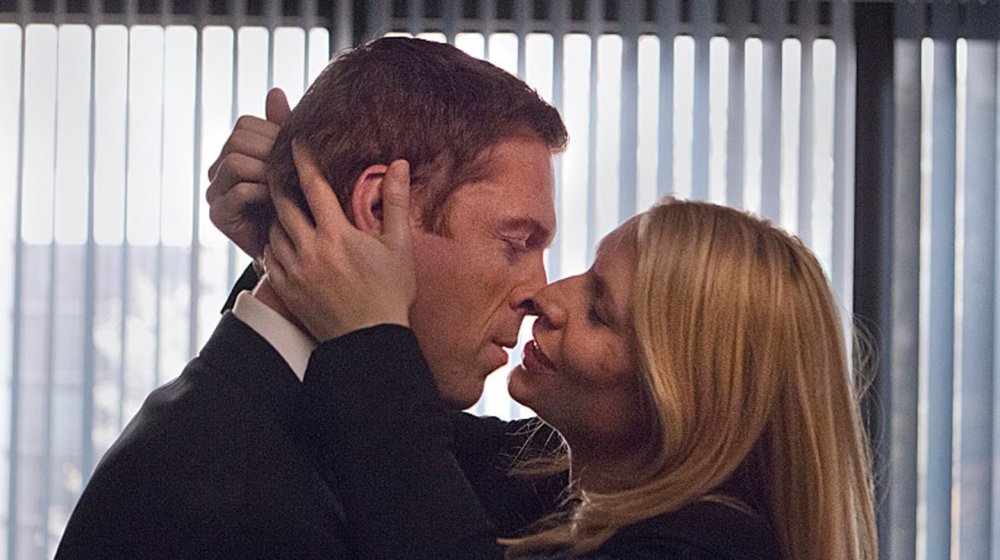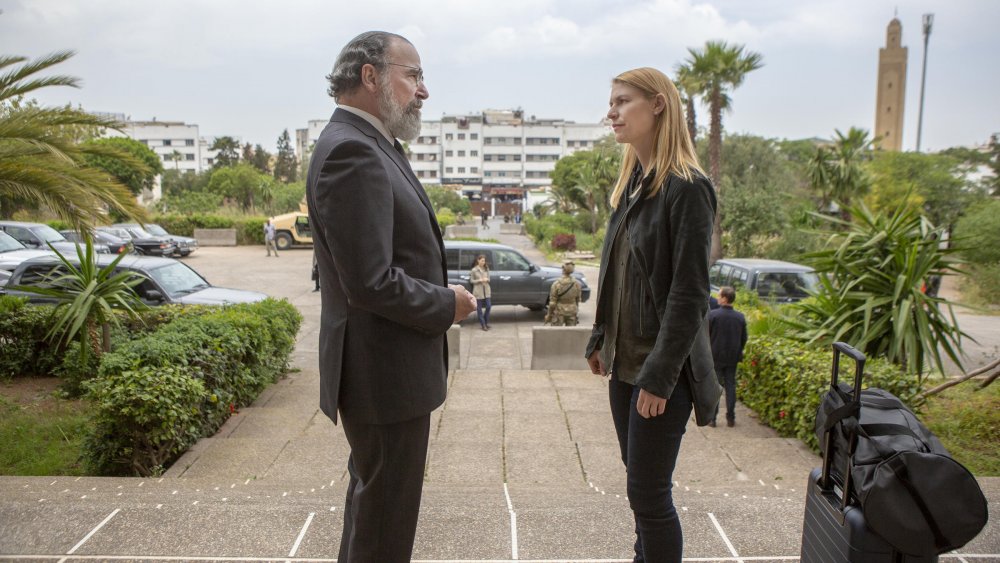The Ending Of Homeland Explained
Contains spoilers for the final season of Homeland
The televised portion of Carrie Mathison's (Claire Danes) journey may be at an end, but Showtime's long-running spy thriller, Homeland, dropped an ending that certainly allows fans to speculate about what comes next.
Homeland debuted back in 2011, which seems like another lifetime in terms of contemporary politics, with which the CIA drama is concerned. Creators Alex Gansa and Howard Gordon originally adapted the premium series from an Israeli show titled Hatufim, which literally translates to "Abductees." Showtime's version followed Danes' Carrie, a dedicated and amoral CIA field agent who struggles with bipolar disorder and manic schizophrenia. Despite her mental health challenges, Carrie is an effective agent upon whom her boss and mentor Saul Berenson (Mandy Patinkin) regularly relies for the most challenging and dangerous missions. Even though Carrie's ethically questionable tactics often run afoul of Saul's conscience, he trusts her to carry out her mission at all costs.
In many ways, the final season of Homeland was a mirror image of the series' debut. On the show's first season, Carrie was charged with investigating Sgt. Nicholas Brody (Damian Lewis), a U.S. Army vet returned home after ten years of captivity in Afghanistan. Brody was ostensibly rescued by a military team in the region along the Afghan-Pakistani border, but questions soon circled about whether or not he had been turned by the Taliban and intentionally seeded back into U.S. custody. Brody's true allegiances were ultimately revealed after he assisted in the assassination of the sitting Vice President, and Carrie was the one who took him into custody, despite having initiated a romantic relationship with him (which may have just been cover? Nothing's ever clear with Carrie).
Brody's waffling loyalty is a major point of contention in the series up until his hanging in Iran during season 3. In the final season, Carrie becomes the Brody.
Is Carrie Mathison compromised on the final season of Homeland?
At the end of Homeland's penultimate season, Carrie was left in the custody of Russian intelligence. Her GIU handler, Yevgeny Gromov (Costa Ronin), withheld her antipsychotic medication, allowing her to succumb to her disease for the duration of her incarceration. By the time Saul actually managed to negotiate for her release, months had passed, and Carrie was mired in the depths of a psychotic break.
At the outset of the final season, Carrie is recovering at a VA hospital. She's back on her meds and fully functional, though she's still missing time from her captivity. She wants to get back to work at the CIA, even though her doctors think she's far from ready. A failed polygraph test calls into question her loyalty to her country, and lingering questions about her time in a Russian prison and her relationship to Yevgeny haunt her efforts to regain security clearance.
Enter Saul Berenson, come to save the day. Saul is now serving as National Security Advisor to the president, and he wants to place Carrie back in the field to help negotiate a fragile peace between the Taliban and the government of Afghanistan. Saul overrides both Carrie's doctors and the CIA inspector to reinstate her at Kabul Station under the purview of the NSA. She doesn't exactly receive a warm welcome from the CIA station chief, who's been warned by the Agency that Carrie might be compromised. Carrie's behavior upon arrival doesn't do much to bolster her case, either, as she regularly flouts CIA protocol to run off-the-books operations for Saul, and even sets up a series of very suspicious meetings with Yevgeny, who also just happens to be working out of Kabul.
Her suspect behavior echoes what we saw of Sgt. Brody on the first two seasons of Homeland. Much of the final season is dominated by the same is-she-isn't-she speculation that defined the early episodes of the series, and we don't really get an answer until the final moments of the finale.
Carrie Mathison defects on the Homeland series finale
Returning to Afghanistan for the final season felt like the right call for the series. The show has always been credited for its eerie predictive ability, often telegraphing events in politics or foreign affairs months before they actually happen. Homeland's season 8 story about an effort to negotiate an end to America's longest war follows this trend. Remember, the series began with Brody, an active-duty soldier during the initial invasion of Afghanistan. By ending with an effort to negotiate a stable peace, the showrunners both brought the story full circle and emphasized the sheer scope and human toll of this very real, very drawn-out war.
With a cease-fire between the U.S. and the Taliban nearly at hand, Saul's generational work in the region is about to reach fruition. All the time spent at the multilateral negotiating table is about to pay off when a helicopter carrying both the President of the United States and the Afghan President goes down on its way from Bagram to Kabul. The sudden deaths of the leaders who intended to sign the peace accords sends the entire region into chaos, threatening to drag America's inexperienced and pugnacious new president into a nuclear war with Pakistan.
In order to track down the stolen flight recorder from the President's helicopter and avert global disaster, Carrie escapes from Kabul Station and enlists the help of ... Yevgeny Gromov.
Carrie Mathison always knows the right thing to do
Yevgeny ultimately helps Carrie track down the stolen flight recorder in southern Afghanistan. The recording reveals that the helicopter went down from a mechanical failure. This is a truth that would instantly alleviate all the tensions in the region, and prevent the U.S. and Pakistan from blowing each other up, but, before Carrie can return the recorder to Saul, Yegeny knocks her out and steals it from her.
Carrie should have known that Yevgeny wasn't just helping her out of the goodness of his heart. He always had his own motivations for wanting to find the flight recorder. Carrie gets sent back to Washington with nothing to show for her efforts but her word, which isn't worth much with anyone whose name isn't Saul.
Yevgeny ultimately offers Carrie a deal: His government will turn over the flight recorder and help the U.S. make peace with Pakistan if Carrie gives up the name of a deep-cover agent that Saul has been running in Moscow since the '80s. Carrie denies knowing about any agent in the Russian government, but Yevgeny promises her it's true. If Saul won't give up the name of his agent, Yevgeny expects Carrie to kill him and inherit the source.
Carrie Mathison betrays Saul on the series finale of Homeland
Carrie obviously believes that no one life is worth allowing the U.S. and Pakistan to go to war. Shockingly, she agrees to Yevgeny's terms. At this point, she's working neither on behalf of the U.S. government nor her Russian handler, but on behalf of the Mathison Moral Code.
Saul gives a relevant speech during the penultimate episode of the series in which he tells a young CIA officer that, even though Carrie seems unhinged and makes a lot of mistakes, she, "Never loses sight of what's important." His rumination on Carrie's value as an agent proves prescient. On the final episode, that patented Mathison doggedness places Saul directly in the crosshairs.
Carrie first attacks the problem head-on, asking Saul to reveal the identity of his agent in Moscow. Saul denies the agent's existence, leaving Carrie no choice but to proceed with Plan B. Using a volatile compound that she received from the GRU, she temporarily paralyzes Saul and brings in a Russian kill team to stage a fake assassination attempt. Even with the poison needle to his foot, Saul refuses to out his source, but Carrie has planned for that possibility, too.
She leaves Saul in the custody of the Russians and flies to Israel, where she tells Saul's sister that Saul has passed away. Carrie's hunch, which proves correct, is that Saul would have deputized his sister to discharge a succession plan in the event of Saul's untimely death. Saul's sister produces a thumb drive, which she was instructed to give to Carrie upon confirmation of her brother's demise, and which holds the identity of the off-books source in Moscow. Without sparing any time for sentimentality, Carrie makes the trade with Yevgeny, resulting in the American agent's death by suicide.
So Carrie Mathison is a Russian agent now?
The Russians turn over the flight recorder, revealing the information about the helicopter crash on the world stage – an act that averts disaster along the Afghanistan-Pakistan border. Carrie has possibly saved the world from nuclear war, but she's also cost a loyal agent her life, and effectively blinded the CIA to everything going on inside of Moscow. She knows that she'll never come back from this one with Saul, so she flees to Syria with Yevgeny and, from there, to Moscow.
The final sequence of the series jumps forward two years. Carrie is now living in Moscow with Yevgeny. She authored a memoir subtitled "Why I Had to Betray My Country." The tell-all book about her time with the CIA seems to confirm her decision to defect to Russia. Saul, who is apparently recovering from a heart attack, receives a copy of the book in the mail, directly from Carrie. He discovers in the spine of the book a secret note: "Greetings from Moscow, Professor Rabineau. Russian missile defense sold to Iran and Turkey has a backdoor. It can be defeated. Specs to follow. Stay tuned."
Carrie may have crossed Saul and burned his source in Moscow to avert a war, but she found a way to install herself in that agent's place, becoming the new off-book spy at the highest levels of the Kremlin. Even her memoir was only written to establish her cover. Although some of her decisions were questionable, Carrie proved herself a patriot in the end.
Homeland showrunner and co-creator Alex Gansa explains the series finale
In the wake of the Homeland series finale, co-creator and showrunner Alex Gansa spoke with The New York Times to unravel the ending and explain some of the choices that were made.
Something that was absolutely intentional was placing Carrie in a position where she could be viewed as a traitor. "We had decided that we wanted to tell the last story in Afghanistan, and we already knew two big things," Gansa said, referring to himself and Homeland's other co-creator, Howard Gordon. "We knew that a president's helicopter was going to go down in a war zone, and we knew that we wanted to put Carrie Mathison in Nicholas Brody's shoes."
The question of how to do that didn't get answered until a ways down the road, when the day prior to the final Homeland shoot, Gansa thought about infamous whistleblower Edward Snowden's book Permanent Record, which in part inspired Carrie's own Tyranny of Secrets. (Snowden even contributed insight to Homeland's creative team during the production of season 5.)He explained, "I was like, 'Whoa!' What if Carrie has been spending the last two years writing an expose of the C.I.A.?'"
Carrie's book was dedicated to her daughter Franny, whom Gansa noted may have a tough time moving forward: "Franny got sacrificed. Not only has Franny been abandoned by her mother, but her mother is now like Edward Snowden and is considered a traitor. That's going to be a very hard thing for that young girl — and, eventually, that young woman — to accept and understand."
As for whether Carrie got a happy ending, Gansa thinks so. More importantly, he shared that the series as a whole ended in the way that it should have. "Is it a happy ending? I think Carrie is happy. We wanted the show to end in a bittersweet way, not in a grim way. And in this uncertain time, I'm relieved that there's some redemption here," said Gansa. "Anything that ends with a little good cheer, I'm weeping, like, 'Thank God.'"






